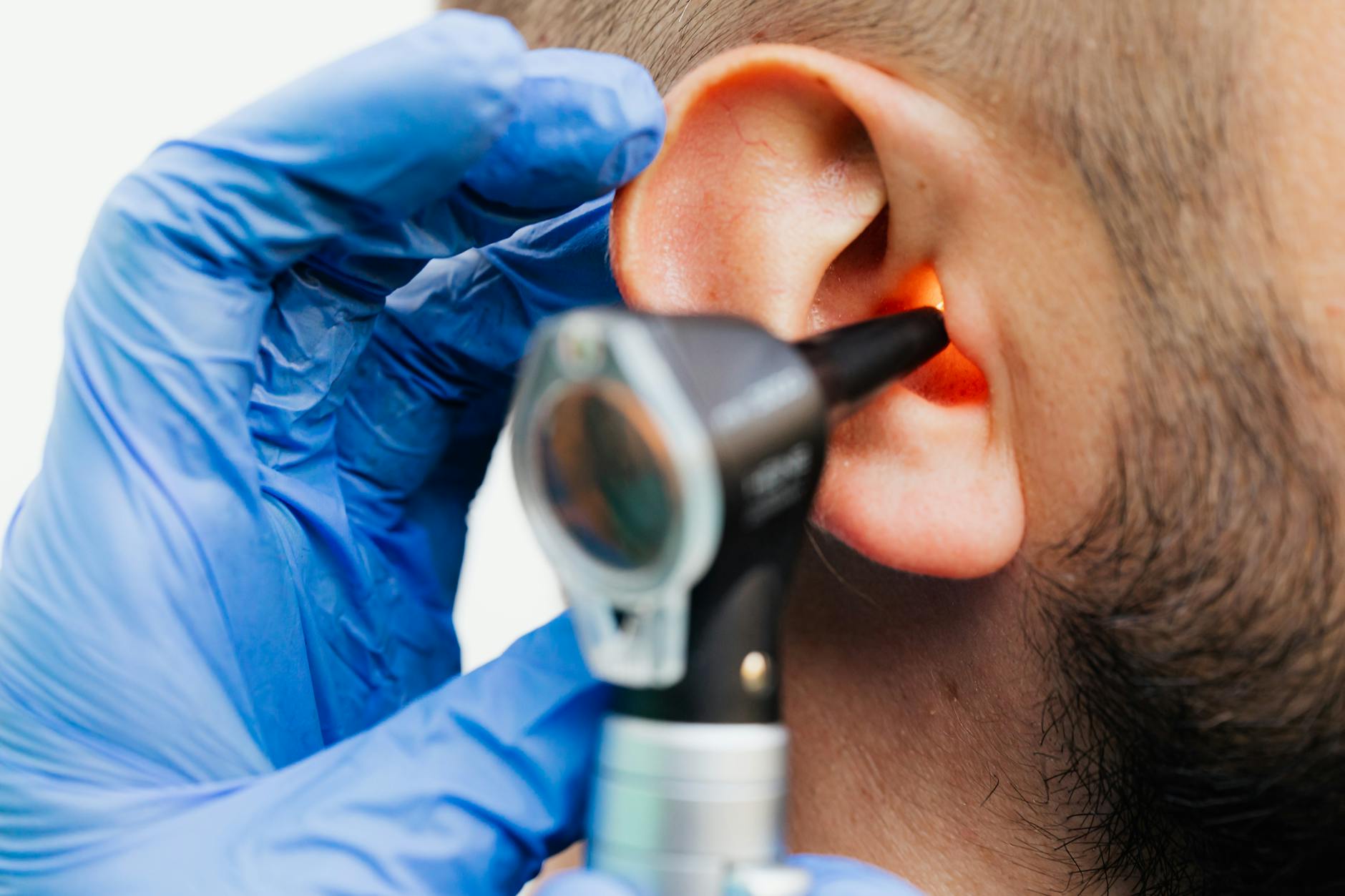


Did you know something as simple as a food allergy could be linked to your hearing? It might sound surprising, but research shows that food allergens can trigger reactions in the body that impact your ears as well. From inflammation to fluid buildup, these immune responses can lead to issues like muffled hearing, itchiness, or even temporary hearing loss. If you’ve ever experienced unexplained ear discomfort, your diet could be playing a bigger role in your hearing health than you’d expect. Keep reading to uncover how these connections work and what you can do about them.
When we think about allergies, it’s easy to imagine sneezing during spring or breaking out in hives after touching a plant. But food-allergies take this to a different level. They involve a complex relationship between what you eat and your body’s immune response, often triggering reactions that can affect more systems in your body than you might expect. Let’s explore how food-allergies disrupt the immune system and the noticeable effects they can cause.
Food-allergies occur when the immune system mistakes a harmless food protein as a dangerous invader. When someone with a food allergy eats even a tiny amount of that specific food, their immune system swings into action—sometimes too forcefully.
Here’s what happens step-by-step:
This chain reaction happens fast—sometimes within minutes. While the effects of histamines are helpful for fighting genuine threats like infections, during an allergic reaction, this “false alarm” does more harm than good.
When you hear about food allergy symptoms, you likely think of hives or an upset stomach—but the effects can be far-reaching. Food-Allergies manifest in many ways and can impact various body systems, including the ears, nose, and throat.
Here are the most common signs:
But there are other, less-discussed symptoms worth noting:
Each person’s reaction can look different. Some might develop mild, isolated symptoms, while others might experience anaphylaxis, a life-threatening condition that requires immediate medical attention. Recognizing how food-allergies express themselves, even in unexpected ways like ENT symptoms, is key to managing them.
The human ear is a remarkable organ, intricately designed to transform sound waves into signals our brain can understand. But like any finely tuned system, it has points of vulnerability. Allergic reactions, particularly food-related ones, can sneakily disrupt this balance. To grasp how, let’s explore how the ear functions and identify areas where allergies might interfere.

Close-up of a doctor using an otoscope to examine a patient’s ear in a clinical setting.
Photo by Kaboompics.com
The Eustachian tube, a narrow passage between the middle ear and the back of the throat, plays a critical role in maintaining ear health. Its main job? Balancing air pressure inside your ear with the outside environment. This is why your ears “pop” on a plane or at high altitudes—it’s the Eustachian tube opening to equalize pressure.
But here’s where allergies can get in the way. Allergic reactions can cause inflammation, swelling, or excessive mucus production, all of which may block this tube. A clogged Eustachian tube prevents proper drainage and equalization of air pressure, leading to uncomfortable symptoms like:
For those with seasonal or food-triggered allergies, this dysfunction can become a recurring problem. Managing nasal or sinus symptoms can often relieve some of the pressure on the Eustachian tube, improving ear health.
Inflammation is the body’s defense mechanism, but in the ear, it often creates more problems than solutions. When an allergen triggers an immune response, histamine release leads to swelling and increased blood flow to affected tissues. In the context of hearing, this impacts the delicate structures of the middle and inner ear.
Here’s how inflammation may affect the ear:
Temporary hearing changes are common during inflammation, but chronic issues could point to an underlying problem with allergies or other health conditions. Think of the ear canal and middle ear as finely tuned components of an instrument; even a slight disruption can spoil the harmony. Keeping inflammation in check is key to maintaining optimal hearing.
By understanding the anatomy of hearing and how allergies can interfere, it’s easier to see why managing these reactions is essential—not just for your overall health but specifically for protecting your ears.
Food-allergies don’t just cause itchy skin or digestive trouble—they can directly influence how we hear the world around us. If you’ve noticed issues like temporary hearing loss, muffled sounds, or even persistent ringing after an allergic episode, your ears might be reacting to more than you think. Allergies trigger inflammation and immune responses that can interfere with vital ear functions, leading to surprising auditory issues.
Ever feel like your ears are “plugged” during an allergic reaction? That’s not your imagination. Food-allergies can create inflammation throughout the body, including in the sensitive areas of your ears. Specifically, this happens when histamines—your body’s way of signaling an immune response—cause swelling and increased mucus production.
Here’s how it plays out:
While these episodes are typically temporary, repeated allergic reactions may lead to chronic ear problems if left unaddressed. Managing your food-allergies isn’t just important for digestion—your hearing health depends on it too.
Tinnitus, the infamous ringing or buzzing sensation in the ears, is another unwelcome side effect of allergic reactions. But what’s the connection? Allergies, particularly food-specific ones, can set off a chain reaction that disrupts how the inner ear functions.
If you’ve ever noticed your tinnitus flaring up after consuming certain foods—such as dairy, gluten, or salty snacks—you’re not alone. Studies show that food-allergies or intolerances impact ear health, especially tinnitus, in ways we’re still working to understand.
Although tinnitus caused by allergies is often temporary, it can feel persistent and disruptive. For chronic sufferers, identifying the underlying allergenic food triggers is crucial. The sooner these dietary culprits are addressed, the sooner the constant ringing can subside, allowing your ears—and peace of mind—to recover.
When it comes to food-allergies and their potential impact on hearing, the right prevention and management practices can make a world of difference. By taking control of your allergen exposure and seeking the right medical guidance, you can reduce risks and safeguard both your overall health and ear health. Here’s a closer look at some effective strategies.
Knowing which foods to avoid is the cornerstone of managing allergies. It’s not a one-size-fits-all situation, so tailoring your approach to your own triggers is key.
Taking these steps not only limits reactions through proper prevention but also reduces the strain allergies can place on ear health.
If you’ve been dealing with recurring allergic reactions or unexplained hearing symptoms, it’s time to involve the experts. Knowing when to consult medical professionals can make managing food-allergies—and their impact on your hearing—easier and safer.
Taking a combined approach with medical and self-managed strategies is often the most effective path forward. Don’t wait until symptoms worsen; addressing the issue early helps you stay ahead of complications like temporary hearing loss or other ENT-related challenges. By teaming up with healthcare providers, you’re investing in both your immediate and long-term wellness.
Navigating life with food-allergies involves more than just avoiding triggers; it’s about creating habits that support overall well-being. Interestingly, maintaining a healthy diet and tracking your immune system’s performance can also play a key role in safeguarding your hearing. By focusing on immune-boosting foods and staying proactive about your health, you reduce both allergic reactions and their ripple effects, such as hearing-related disruptions. Let’s dive deeper into how these lifestyle changes bring benefits.

A person picking fresh organic tomatoes from a garden basket, showcasing natural produce and healthy living.
Photo by Nataliya Vaitkevich
Your diet is one of the most effective tools for keeping your immune system in check. While it may not “cure” food-allergies, a balanced diet filled with essential nutrients supports your immune system’s ability to handle reactions more efficiently.
Here are some foods that can strengthen your immune system and reduce inflammation that may interfere with hearing:
Incorporating these foods consistently into your diet can create a strong baseline to better combat the frequent allergic reactions that may contribute to ear health issues like muffled hearing or sinus blockages.
Easy adjustments to your eating habits can also yield benefits:
Regular meals that prioritize immune-friendly options don’t just nourish your body—they act like preventive maintenance for your overall health, including hearing.
Proactivity is your best defense when managing food-allergies and preventing related complications like hearing issues. Having a game plan to address changes in your hearing or allergy reaction frequency ensures small problems don’t spiral into larger health concerns.
Why are regular checkups so critical? Here’s the breakdown:
Tips for Monitoring and Acting Quickly:
By taking a holistic and proactive approach, you can manage allergy-related symptoms and help protect your hearing health. Immune support, early detection, and timely intervention create a winning combination when living with food allergies.
The link between food-allergies and hearing health highlights how interconnected our body systems truly are. Unchecked allergic reactions can lead to inflammation, fluid buildup, and even temporary hearing loss—all through mechanisms tied to your immune response. By recognizing these surprising connections, you can take proactive steps to protect both your hearing and overall well-being.
Managing allergies isn’t just about comfort—it’s about prioritizing your health. If food allergies are impacting your hearing, now is the time to seek advice, pinpoint triggers, and make informed choices. Consistent care and awareness can help you prevent long-term issues.
Have you noticed changes in your ears after certain meals? Don’t ignore these signals—your body could be pointing you toward a clearer path to better health.





